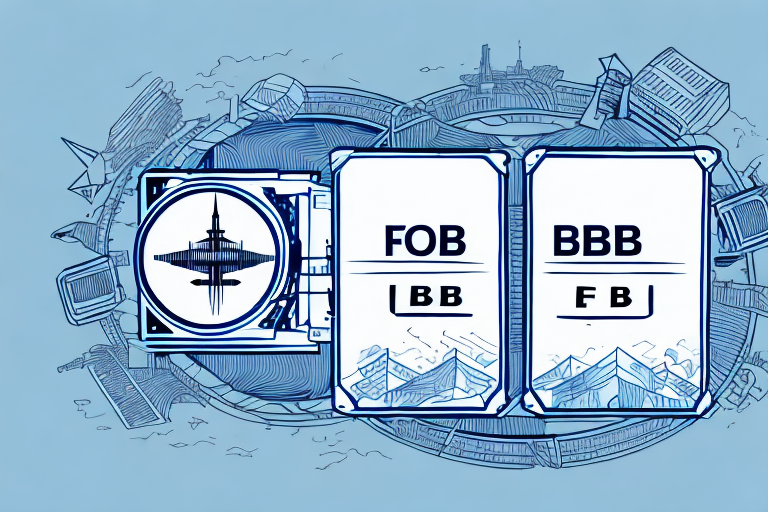Understanding Incoterms Collect: What You Need to Know
When it comes to international trade, understanding the intricacies of the Incoterms system is crucial. One specific Incoterm that has gained popularity in recent years is Incoterms Collect. In this article, we will cover everything you need to know about Incoterms Collect, including its definition, benefits, key differences from other Incoterms, challenges, and much more.
What are Incoterms?
Before we delve into the specifics of Incoterms Collect, let’s first discuss what Incoterms are. Incoterms are a set of standardized terms that define the responsibilities, risks, and costs associated with the transportation and delivery of goods between buyers and sellers in international trade. The International Chamber of Commerce (ICC) developed the Incoterms rules in 1936 and has updated them periodically to reflect the changing needs of international trade practices. There are currently 11 Incoterms that are recognized globally.
It is important to note that Incoterms are not laws or regulations, but rather a voluntary agreement between the buyer and seller. They are used to clarify the terms of the sale and ensure that both parties understand their obligations and liabilities. Incoterms cover a range of topics, including the delivery of goods, payment terms, insurance, and customs clearance. By using Incoterms, international trade becomes more efficient and transparent, reducing the risk of disputes and misunderstandings between buyers and sellers.
What is Incoterms Collect?
Incoterms Collect is an Incoterm that was introduced in 2010 and is increasingly becoming popular in international trade. It is an arrangement between the buyer and seller where the buyer pays the cost of goods and the shipping fees upfront, which are then collected by the seller at the destination port. In simpler terms, it is a type of freight prepaid that puts the financial burden on the buyer instead of the seller.
One of the advantages of using Incoterms Collect is that it reduces the risk of non-payment for the seller. Since the buyer has already paid for the goods and shipping fees, the seller can be assured of receiving payment upon delivery. Additionally, it can also help to simplify the payment process, as the buyer only needs to make one payment upfront instead of multiple payments throughout the shipping process.
However, it is important to note that Incoterms Collect may not be suitable for all types of transactions. For example, if the buyer is not familiar with the seller or if the goods are of high value, the buyer may be hesitant to pay upfront. In such cases, it may be more appropriate to use other Incoterms such as CIF or FOB.
How Incoterms Collect works in international trade
When using Incoterms Collect, the buyer assumes the risk, responsibility, and costs associated with the transportation and delivery of goods from the seller’s warehouse or factory to the designated port of discharge. The buyer then arranges for the shipment with a freight forwarder, who then pays the shipping fees on behalf of the buyer. The Incoterms Collect seller will receive payment from the buyer for both the cost of the goods and the shipping fees.
It is important to note that Incoterms Collect is not a payment method, but rather a shipping term that outlines the responsibilities of the buyer and seller in the transportation of goods. The buyer is still responsible for arranging payment to the seller for the cost of the goods and shipping fees, which can be done through various payment methods such as wire transfer or letter of credit. Additionally, it is recommended that both parties have a clear understanding of the terms outlined in the Incoterms Collect agreement to avoid any misunderstandings or disputes during the transaction.
The benefits of using Incoterms Collect
One of the main advantages of using Incoterms Collect is that it allows for better cash flow management. The buyer can budget better by knowing the exact cost of shipping upfront and can also negotiate a better shipping rate with the freight forwarder. Additionally, Incoterms Collect can be beneficial for new and less experienced buyers because it puts the responsibility on the buyer to arrange shipping, reducing the risk for the seller.
Another benefit of using Incoterms Collect is that it can simplify the shipping process. With the buyer taking on the responsibility of arranging shipping, the seller can focus on other aspects of the transaction, such as production and quality control. This can lead to a smoother and more efficient process overall.
Furthermore, using Incoterms Collect can provide greater transparency and accountability in the shipping process. The buyer is responsible for selecting the freight forwarder and arranging the shipment, which means they have greater control over the process and can ensure that the shipment is handled properly. This can help to prevent delays, damage, and other issues that can arise during shipping.
Common mistakes to avoid when using Incoterms Collect
One of the most common mistakes when using Incoterms Collect is not understanding the associated costs, such as terminal handling charges, customs clearance fees, and additional charges at the destination port. To prevent these mistakes, the buyer should discuss all potential costs with the seller and freight forwarder upfront. Additionally, both parties need to ensure they correctly label the goods as Incoterms Collect in their documentation to avoid any misunderstandings during the transaction process.
Another common mistake to avoid when using Incoterms Collect is not properly assessing the risks and responsibilities of each party involved in the transaction. It is important to clearly define who is responsible for the goods at each stage of the shipment, including loading, transportation, and unloading. This can help prevent disputes and ensure that both parties are aware of their obligations. It is also important to consider the insurance coverage for the goods during transportation, as this can vary depending on the chosen Incoterm. By properly assessing the risks and responsibilities, both parties can ensure a smooth and successful transaction.
How to negotiate Incoterms Collect with your trading partner
As with any Incoterm arrangement, the buyer and seller need to negotiate the terms of Incoterms Collect. The Incoterms Collect should only be adopted after both parties agree that it is the best option for their specific needs, and all associated costs, risks, and procedures are clearly defined. It is important to discuss the specifics of the transaction, such as the quantity and quality of the goods, the destination port, the mode of transportation, and customs clearance requirements, among others.
Once the terms of Incoterms Collect have been agreed upon, it is important to ensure that all parties involved in the transaction are aware of their responsibilities. The buyer and seller should clearly define their roles and obligations, including who is responsible for arranging and paying for transportation, insurance, and customs clearance. It is also important to establish a timeline for the transaction, including the date of delivery and payment.
In addition, it is recommended that the buyer and seller have a written contract that outlines the terms of the Incoterms Collect arrangement. This contract should include all of the agreed-upon details, as well as any additional terms and conditions that the parties wish to include. Having a written contract can help to avoid misunderstandings and disputes down the line, and can provide a clear reference point for both parties throughout the transaction.
Key differences between Incoterms Collect and other Incoterms
One significant difference between Incoterms Collect and other Incoterms is how the shipping fees are paid. Unlike other Incoterms where the seller pays the shipping fees, under Incoterms Collect, the buyer is responsible for payment. Additionally, under Incoterms Collect, the seller only receives payment after the goods have arrived at the destination port, whereas with other Incoterms, the seller typically receives payment upfront or upon shipment.
Factors to consider before choosing Incoterms Collect
Before choosing Incoterms Collect, buyers and sellers need to carefully evaluate their specific needs and the advantages and disadvantages of this option. One factor to consider is the level of experience and expertise needed to handle shipping logistics and customs clearance. If the buyer is inexperienced, Incoterms Collect may not be the best choice. Additionally, buyers need to understand all the associated costs, such as customs duties, terminal handling charges, and related fees.
Examples of successful transactions using Incoterms Collect
Incoterms Collect can be beneficial when both the buyer and seller understand the specific costs and risks associated with their transaction. For example, a manufacturer sells its products to a buyer who is responsible for shipping to the destination port. The buyer has an established relationship with a freight forwarder and can negotiate better shipping rates. The buyer also has the advantage of managing cash flow better by knowing the exact costs upfront.
The role of a freight forwarder in using Incoterms Collect
A freight forwarder can be instrumental in arranging the shipment of goods when using Incoterms Collect. The freight forwarder can handle everything from coordinating the shipping logistics, arranging customs clearance, and other necessary documentation. It is important to establish a good working relationship between the buyer, seller, and freight forwarder to ensure a successful Incoterms Collect transaction.
How to ensure compliance with Incoterms Collect regulations and laws
When using Incoterms Collect, it is essential to ensure compliance with all relevant laws and regulations concerning international trade. This includes understanding laws around contract terms, import/export regulations, and customs clearance requirements. To ensure compliance, buyers and sellers should conduct due diligence, seek expert advice when necessary, and stay up-to-date on any changes in laws or regulations.
Challenges and risks associated with using Incoterms Collect
Like any Incoterm arrangement, there are risks and challenges associated with using Incoterms Collect. One significant risk is not understanding the specific costs and fees associated with shipping, which can result in unexpected expenses for the buyer. Additionally, there may be challenges with customs clearance and other regulatory requirements, which can delay the shipment of goods. To mitigate these risks, it is essential to understand all aspects of the transactions and seek expert advice when necessary.
How to resolve disputes when using Incoterms Collect
If a dispute arises when using Incoterms Collect, the first step is to refer to the agreed-upon contract, which should outline the specific responsibilities of both parties. If the dispute cannot be resolved through negotiation, parties can consider legal action or mediation. It is, however, important to note that this can be costly and time-consuming. As such, it is often best to seek expert advice to prevent disputes from arising in the first place.
The future of Incoterms Collect in international trade
As international trade practices continue to evolve, it is likely that Incoterms Collect will continue to grow in popularity among buyers and sellers. However, as with any Incoterm arrangement, buyers and sellers need to carefully evaluate their specific needs and the advantages and disadvantages of this option before choosing it. As always, seeking expert advice and staying up-to-date on changing laws and regulations is essential.
In conclusion, understanding Incoterms Collect is essential for anyone involved in international trade. By carefully evaluating the specific needs of the buyer and seller, understanding the advantages and disadvantages of this option, and seeking expert advice when necessary, businesses can successfully use Incoterms Collect to manage cash flow, reduce risks, and improve efficiency when transporting goods internationally.






















